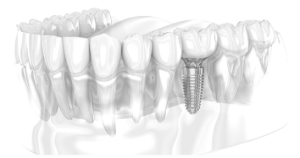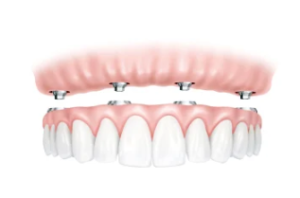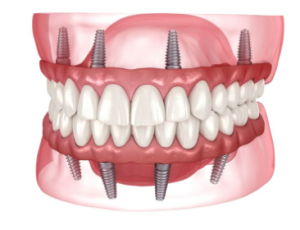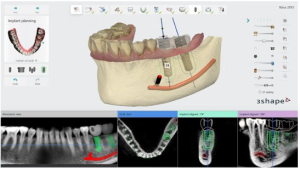Dental implants have become one of the most popular dental treatments today due to their ability to effectively replace missing teeth with results that closely mimic natural teeth. However, the most common question patients ask is “how long do dental implants last?” This crucial information helps patients make informed decisions about their dental treatment.
How Long Do Dental Implants Last?
Dental implants can last 25-30 years or even a lifetime when properly cared for. The exact lifespan depends on several factors, which we’ll explore in detail throughout this comprehensive guide.
Long-term studies show that high-quality titanium dental implants placed by specialist dentists have a remarkable success rate of 95-98% over the first 10 years and continue to perform well long-term. This exceptional durability makes dental implants an excellent investment in your oral health.
Key Factors Affecting Dental Implant Lifespan
1. Quality of the Dental Implant
The material used to manufacture the dental implant is the most crucial factor determining longevity. High-quality titanium implants offer superior durability and excellent biocompatibility with bone and oral tissues. European and American implants typically maintain higher quality standards and longer lifespans, though they come with premium pricing.
2. Dentist’s Skill and Experience
Dental implant placement requires specialized expertise and extensive experience. This is particularly important for anterior dental implants, which demand high precision to achieve beautiful, natural-looking results in the visible front teeth area.
3. Patient’s Oral Health Condition
The health of your gums and jawbone plays a vital role in dental implant success. Patients with gum disease or insufficient bone density may require bone grafting procedures before implant placement to ensure long-term stability.
4. Post-Treatment Care and Maintenance
Consistent cleaning and proper maintenance are essential keys to extending dental implant lifespan. This includes regular brushing, flossing, and attending scheduled follow-up appointments with your dentist.
Types of Dental Implants and Their Longevity
Single Dental Implants
Single tooth implants with proper care, they can last 25-30 years or longer, making them an excellent long-term solution for individual missing teeth.
Dental Implant Bridge
partially missing teeth can be replaced with dental implant bridge by using 2 implants supporting 3-4 teeth. Dental implant bridges can also last 25-30 years or longer with good oral hygiene and maintenance.
All-on-4 Full Mouth Dental Implants
Full mouth dental implants using the All-on-4 technique utilize 4-8 implants to support an entire arch of teeth. This innovative system typically lasts 25-30 years, depending on care and usage patterns.
Treatment Steps That Impact Implant Longevity
Proper dental implant procedures following established protocols significantly extend lifespan:
Comprehensive Examination and Assessment
Dentists thoroughly examine jawbone condition, gum health, and bone thickness using X-rays and 3D imaging. Accurate assessment enables optimal treatment planning for maximum long-term success.
Bone Grafting (When Necessary)
When jawbone thickness is insufficient, bone grafting becomes essential before implant placement. This crucial step ensures long-term implant stability and integration.
Precise Implant Placement
Expert implant placement using correct techniques by specialized dentists ensures optimal bone integration and high stability for lasting results.
Crown Attachment
After successful implant integration, high-quality crowns made from durable materials like ceramic or zirconia are attached, providing both strength and natural aesthetics.
Essential Care Tips for Long-Lasting Dental Implants
Daily Cleaning Routine
- Brush teeth at least twice daily with fluoride toothpaste
- Use dental floss or interdental brushes to clean between teeth
- Rinse with alcohol-free mouthwash
- Avoid using teeth to bite hard objects or open bottles
Regular Dental Check-ups
Visiting your dentist every 3-6 months is crucial for monitoring implant condition. These appointments include X-rays to assess bone health around implants and professional cleaning to remove tartar buildup.
Overall Health Management
- Avoid smoking, which slows healing and increases infection risk
- Control diabetes to maintain optimal levels
- Eat nutritious foods that support oral health
Warning Signs Requiring Immediate Dental Attention
Despite their high durability, dental implants may occasionally develop problems. Contact your dentist immediately if you notice:
- Swelling, redness, or bleeding around the implant
- Unusual bad breath or taste
- Loose implant or crown
- Pain around the implant area
- Problems with adjacent teeth
Advantages of Dental Implants Over Other Options
Dental implants offer several advantages that contribute to their superior longevity:
Strength and Stability
Dental implants integrate directly with jawbone, providing strength nearly equal to natural teeth and enabling efficient chewing of hard foods.
Jawbone Preservation
When teeth are lost, jawbone gradually deteriorates. Dental implants stimulate bone growth, preventing bone loss and maintaining facial structure.
Natural Aesthetic Appearance
Implant crowns can be customized to perfectly match natural teeth in color, shape, and size, creating seamless results.
Comparing Dental Implant Lifespan with Alternatives
Dental Implants vs. Removable Dentures
- Dental Implants: 20-40 years or lifetime
- Removable Dentures: 5-10 years, requiring periodic adjustments or replacement
Dental Implants vs. Dental Bridges
- Dental Implants: 20-40 years without affecting adjacent teeth
- Dental Bridges: 10-15 years, requiring healthy adjacent teeth to be reduced
Long-Term Cost Considerations
While dental implants have higher initial costs compared to other options, they prove most cost-effective long-term because:
- No frequent replacement or repairs needed
- No impact on adjacent healthy teeth
- Prevention of future oral health complications
Advanced Technology Extending Implant Lifespan
3D Treatment Planning
Advanced 3D planning technology enables precise implant positioning, reducing future complication risks and optimizing long-term outcomes.
Specialized Surface Implants
Modern implants with specially designed surfaces enhance bone integration and increase overall durability and stability.
Choosing the Right Dental Clinic
Selecting the appropriate clinic and dentist significantly impacts implant longevity. Consider these factors:
Dentist Experience and Qualifications
Choose dentists specializing in implantology with extensive experience in dental implant procedures and proven track records.
Technology and Equipment
Clinics with modern technology and standardized equipment deliver superior results and more predictable outcomes.
Safety Standards
Proper surgical facilities with excellent infection control systems are essential for minimizing treatment risks.
Investment Value and Long-Term Benefits
Dental implant pricing varies based on factors like implant type, materials used, and treatment complexity. For anterior dental implants, costs typically start around $1,600-$2,500 per tooth.
When considering long-term value, dental implants lasting 20-30 years prove more economical than dentures requiring replacement every 5-10 years.
Making the Right Decision
When considering dental implants, evaluate these factors:
Patient Age
Younger patients benefit more from dental implants since they’ll enjoy longer usage periods and better return on investment.
Overall Health Status
Patients with good general health and no severe chronic conditions have higher success probabilities.
Lifestyle Considerations
Those seeking convenience in daily life without removable denture maintenance find implants the ideal solution.
Future of Dental Implant Technology
Dental implant technology continues advancing rapidly. New materials and modern treatment techniques will further extend implant lifespans. AI technology in treatment planning and 3D printing will enhance precision while reducing treatment time.
Conclusion
Dental implants can last 25-30 years or even a lifetime with proper care and maintenance. Choosing a standardized clinic, specialist dentist, and maintaining excellent self-care are key factors in ensuring long-lasting implant success.
Whether you’re considering anterior dental implants or full mouth All-on-4 treatment, consulting with specialized dentists for proper assessment and customized treatment planning is essential for optimal results.
Investing in high-quality dental implants and proper maintenance provides beautiful, strong teeth that function effectively for decades, representing excellent value for improved quality of life.

















































